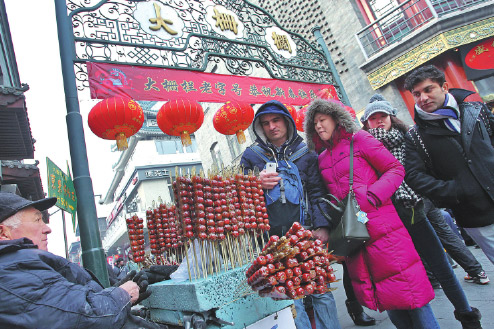 |
|
Travelers show interest in tanghulu, a popular traditional Chinese dessert made of sugar-coated fruit such as haws skewered on a stick, in Beijing's Dashilan commercial area. [PHOTO BY ZHANG WEI/CHINA DAILY] |
The 144-hour policy, allowing for an extended stay in more areas, was approved by the State Council, China's Cabinet, in January 2017.
The decision is expected to boost various sectors including tourism, commerce, and international exhibitions and conferences. It is seen as a spur to consumption and will facilitate coordination and cooperation in the Beijing-Tianjin-Hebei region, Zhu noted.
Beijing was named a pilot city for expanding the opening-up of the services industry in May 2015, the first of its kind in the country.
Zhu said the 144-hour visa-free policy would be a boon to the increased opening-up and further reform of the sector.
He added that it would help the city keep itself in line with international standards and global common practices and attract more foreign professionals, thus boosting the industry in the region.
Beijing has been positioned as a national political and cultural center and a hub for international exchanges and technological innovation, according to the city's development blueprint for 2016-35.
Zhu said the waiver will bring in an influx of inbound travelers, either for business or leisure purpose or on a visit to their friends or family members, which will prompt Beijing to improve its services and increase its international influence.
Flourishing tourism and events will bring about growing spending on accommodation, hospitality and entertainment, spurring consumption by tourists in the Beijing-Tianjin-Hebei region, he added.
Zhu said the move was also conducive to developing an advanced, highly efficient international transportation network in the region, which is key to a world-class urban cluster.
Wang Changyi, director of development planning for the Civil Aviation Administration of China, told a news conference on Dec 18 that the 144-hour visa-free policy is of great significance to the integrated development of Beijing, Tianjin and Hebei.
To advance the implementation of the policy, airlines have cooperated with airports to launch related products, offering more travel options, Wang said.